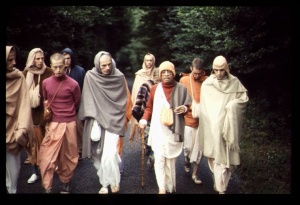SB 10.13.33: Difference between revisions
m (1 revision(s)) |
(Vanibot #0018 edit: make synonym terms in Sanskrit italic in SB - Vanisource) |
||
| Line 1: | Line 1: | ||
{{info | {{info | ||
|speaker= | |speaker=Śukadeva Gosvāmī | ||
|listener=King | |listener=King Parīkṣit | ||
}} | }} | ||
[[Category:Srimad-Bhagavatam - Canto 10 Chapter 13]] | |||
[[Category:Bhagavatam Verses Spoken by Sukadeva Gosvami - Vanisource|101333]] | |||
<div style="float:left">'''[[Srimad-Bhagavatam]] - [[SB 10|Tenth Canto]] - [[SB 10.13: The Stealing of the Boys and Calves by Brahma|Chapter 13: The Stealing of the Boys and Calves by Brahmā]]'''</div> | |||
<div style="float:right">[[File:Go-previous.png|link=SB 10.13.32]] '''[[SB 10.13.32]] - [[SB 10.13.34]]''' [[File:Go-next.png|link=SB 10.13.34]]</div> | |||
{{RandomImage}} | |||
==== TEXT 33 ==== | ==== TEXT 33 ==== | ||
<div | <div class="verse"> | ||
tad-īkṣaṇotprema-rasāplutāśayā | :tad-īkṣaṇotprema-rasāplutāśayā | ||
jātānurāgā gata-manyavo 'rbhakān | :jātānurāgā gata-manyavo 'rbhakān | ||
uduhya dorbhiḥ parirabhya mūrdhani | :uduhya dorbhiḥ parirabhya mūrdhani | ||
ghrāṇair avāpuḥ paramāṁ mudaṁ te | :ghrāṇair avāpuḥ paramāṁ mudaṁ te | ||
</div> | </div> | ||
| Line 17: | Line 22: | ||
==== SYNONYMS ==== | ==== SYNONYMS ==== | ||
<div | <div class="synonyms"> | ||
tat-īkṣaṇa-utprema-rasa-āpluta- | ''tat-īkṣaṇa-utprema-rasa-āpluta-āśayāḥ''—all the thoughts of the cowherd men merged in the mellow of paternal love, which was aroused by seeing their sons; ''jāta-anurāgāḥ''—experiencing a great longing or attraction; ''gata-manyavaḥ''—their anger disappeared; ''arbhakān''—their young sons; ''uduhya''—lifting; ''dorbhiḥ''—with their arms; ''parirabhya''—embracing; ''mūrdhani''—on the head; ''ghrāṇaiḥ''—by smelling; ''avāpuḥ''—obtained; ''paramām''—the highest; ''mudam''—pleasure; ''te''—those cowherd men. | ||
</div> | </div> | ||
| Line 24: | Line 29: | ||
==== TRANSLATION ==== | ==== TRANSLATION ==== | ||
<div | <div class="translation"> | ||
At that time, all the thoughts of the cowherd men merged in the mellow of paternal love, which was aroused by the sight of their sons. Experiencing a great attraction, their anger completely disappearing, they lifted their sons, embraced them in their arms and enjoyed the highest pleasure by smelling their sons' heads. | At that time, all the thoughts of the cowherd men merged in the mellow of paternal love, which was aroused by the sight of their sons. Experiencing a great attraction, their anger completely disappearing, they lifted their sons, embraced them in their arms and enjoyed the highest pleasure by smelling their sons' heads. | ||
</div> | </div> | ||
| Line 31: | Line 36: | ||
==== PURPORT ==== | ==== PURPORT ==== | ||
<div | <div class="purport"> | ||
After Brahmā stole the original cowherd boys and calves, Kṛṣṇa expanded Himself to become the boys and calves again. Therefore, because the boys were actually Kṛṣṇa's expansions, the cowherd men were especially attracted to them. At first the cowherd men, who were on top of the hill, were angry, but because of Kṛṣṇa the boys were extremely attractive, and therefore the cowherd men immediately came down from the hill with special affection. | After Brahmā stole the original cowherd boys and calves, Kṛṣṇa expanded Himself to become the boys and calves again. Therefore, because the boys were actually Kṛṣṇa's expansions, the cowherd men were especially attracted to them. At first the cowherd men, who were on top of the hill, were angry, but because of Kṛṣṇa the boys were extremely attractive, and therefore the cowherd men immediately came down from the hill with special affection. | ||
</div> | </div> | ||
__NOTOC__ | |||
<div style="float:right; clear:both;">[[File:Go-previous.png|link=SB 10.13.32]] '''[[SB 10.13.32]] - [[SB 10.13.34]]''' [[File:Go-next.png|link=SB 10.13.34]]</div> | |||
__NOTOC__ | |||
__NOEDITSECTION__ | |||
Revision as of 12:18, 1 December 2017

A.C. Bhaktivedanta Swami Prabhupada
TEXT 33
- tad-īkṣaṇotprema-rasāplutāśayā
- jātānurāgā gata-manyavo 'rbhakān
- uduhya dorbhiḥ parirabhya mūrdhani
- ghrāṇair avāpuḥ paramāṁ mudaṁ te
SYNONYMS
tat-īkṣaṇa-utprema-rasa-āpluta-āśayāḥ—all the thoughts of the cowherd men merged in the mellow of paternal love, which was aroused by seeing their sons; jāta-anurāgāḥ—experiencing a great longing or attraction; gata-manyavaḥ—their anger disappeared; arbhakān—their young sons; uduhya—lifting; dorbhiḥ—with their arms; parirabhya—embracing; mūrdhani—on the head; ghrāṇaiḥ—by smelling; avāpuḥ—obtained; paramām—the highest; mudam—pleasure; te—those cowherd men.
TRANSLATION
At that time, all the thoughts of the cowherd men merged in the mellow of paternal love, which was aroused by the sight of their sons. Experiencing a great attraction, their anger completely disappearing, they lifted their sons, embraced them in their arms and enjoyed the highest pleasure by smelling their sons' heads.
PURPORT
After Brahmā stole the original cowherd boys and calves, Kṛṣṇa expanded Himself to become the boys and calves again. Therefore, because the boys were actually Kṛṣṇa's expansions, the cowherd men were especially attracted to them. At first the cowherd men, who were on top of the hill, were angry, but because of Kṛṣṇa the boys were extremely attractive, and therefore the cowherd men immediately came down from the hill with special affection.